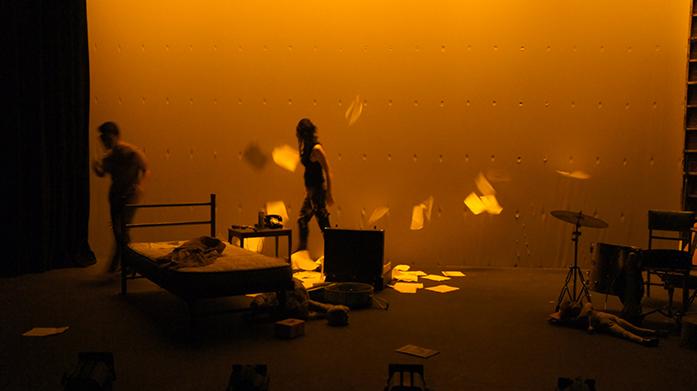After a four-year absence, the Theater Department’s Undergraduate Director Festival returns with plays from four directors.
By Isaac Hamlet
In the boiling seconds of a dramatic moment, when an actor pulls audience members to the edges of their seats with the lung-stopping tension of a perfectly pitched line, it’s easy to see only the actor. Lost are the curators of the theater world, those behind the scenes charged with cultivating the moments.
After a four-year absence, the Undergraduate Director Festival returns at 8 p.m. today in the Theater Building’s Theater B with plays headed by four different directors. The students are enrolled in Professor Alan MacVey’s directing course, for which these are their final projects.
Senior Frankie Rose directed the play *Communicating through the Sunset*, which follows a pair of high-school students, one of whom fosters a crush.
Having admired the script since high school, Rose used a monologue from Sunse*to audition during his first year at the university.
“The theme of the play is healing and being able to recover from traumatic experiences,” he said. “I chose it because, in my experience, people have a hard time connecting with each other. This play directly addresses that issue in a cool way. It depicts what could be a very cliché guy-likes-girl story, and it’s not that.”
Over the three-night run of the festival, each play will perform back-to-back. Because of this, a relatively sparse set was implemented.
“We had to consolidate with sets; we use the same four pieces of furniture for every show,” Rose said. “The three other plays are all set indoors. Mine’s outdoors on a hill.”
That hill is constructed with the furniture at hand.
Though Rose has helped direct small-scale projects, he considers this his directorial début.
“As an actor, you have one main thing to focus on, and that’s being your character,” he said. “As director, you have to worry about the acting, about light, about sound, about making sure everything fits in with your vision. You have to step back and make sure you’re doing your best to tell the story on the page.”
Haley Courter, like Rose, selected a play with which she had a history; she performed a scene from At Home in her Acting I class.
The work follows a couple whose marital status is questionable.
“The script is a challenge,” Courter said. “[The couple] go from saying everything’s OK to crying to hugging to throwing things. There’s a lot of ups and down, and we’ve been figuring out how to balance all of that and make sure the audience understands the complexity of those thought processes.”
Courter was eager to dive into the multiplicity of At Home.
“You can love someone, but sometimes, that’s not always enough,” she said. “You leave not knowing what’s going to happen to this couple, and it’s this uncertainty that’s very true to life.”
To at least one of Courter’s fellow directors, dysfunctional couples are far from foreign.
“It’s a fucked-up, rock and roll love story about two characters who play out their increasingly bizarre fantasies,” said Taylor Edelle Stuart about the play she directed, Cowboy Mouth.
Written by Sam Shepard and Patti Smith and produced in 1971, it depicts Slim and Cavale as the two bake in the heat of sensual sin.
“Sam Shepard was at this crossroad in his life where he wasn’t sure if he wanted to be a playwright or a rock and roll star,” Stuart said. “Then, he met Patti Smith, and they got into this crazy relationship based on raw sex and drugs, and they lived in the Chelsey Hotel together, and in the middle of a fight, they wrote this play in two nights, just passing the typewriter to each other.”
Stuart’s initial attraction to the script was partially the thrill.
“I was blinded by the sex, drugs, and rock ’n’ roll idea of it,” she said. “I wanted to assault the audience, almost, with all these crazy concepts.”
But as she dug into the play, she was unable to find bedrock. Instead, she found layer after layer, and she fell in love with the characters.
“I came in with an entirely different plan, and slowly but surely, it just evolved into what it is now,” Stuart said. “I’ve found so many ways to read it every single day, and that’s just good writing; that’s just honest art.”
The festival’s final director is fifth-year senior Ariel Davis and her version of An Altar Boy Talks to God.
“I’ve felt a lot freer to do whatever I wanted,” the experienced director said. “This is the first time I’ve been able to think, ‘What extreme can I take this to?’ My actors have allowed me to do that; they’re willing to go to that extreme.”
One of these freedoms should be immediately apparent.
“I cast God as a woman,” Davis said. “Not as some feminist statement. It’s just what I felt was the appropriate voice. The audience [members will] read it however they want.”
Having seen both her play and those of her peers, Davis is impressed.
“This is more than just a class project; we’ve put everything we have into this,” she said. “The thing about young directors is we don’t work in boxes. We aim high, and I haven’t seen anyone fall yet.”
From tonight until Saturday, theatergoers will have the chance to witness what Davis has: a generation of directors on the cusp of coming into the world.
“I want people to see this and be — whatever this word means to them — changed,” Stuart said. “I think if people see a film, or watch a performance, or listen to a song, and their life isn’t the least, most miniscule bit different, then I think that the art has failed.”



